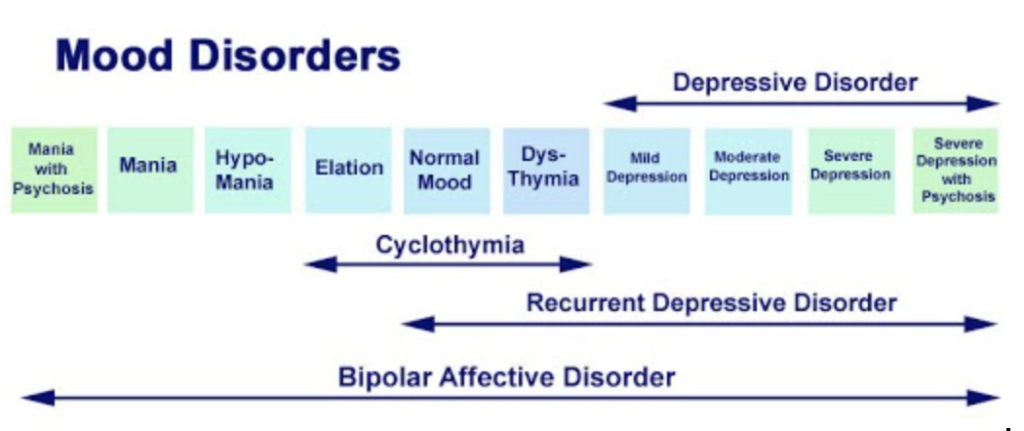Content Warning: Suicidal Thoughts
What is depression?
Admittedly, this is a question that is far more challenging to answer than one would think, primarily due to the fact that the disorder is not categorical. Instead, it is on a continuum. What is meant by this is that there are various levels of depression, meaning that symptoms vary from person to person. It is not as simple as labeling people as having depression or not, as many incorrectly assume.

An example of what this continuum looks like. In this post, we will be focusing on the right-most categories (Source:https://sites.google.com/site/psicologytomgon/mood-disordes)
With this being said, it is easy to get mixed up in the complexities of depression because of the skewed perceptions caused by societal stigma. Here, we will be taking the clinical and everyday understandings of the disorder to answer the initial question.
What is Depression?
At its core, depression (also known as clinical depression or depressive disorder) is a mood disorder that debilitates your ability to feel, think, and act. There are various forms of depression, including:
Major/Severe Depression: Having depressive symptoms nearly all day, everyday for at least a two week period that hinder one’s ability to function regularly
Persistent Depressive Disorder (Dysthymia): Having depressive symptoms for at least two years
Perinatal Depression (Postpartum Depression): Women experiencing major depression during pregnancy or after delivery
Seasonal Affective Disorder (Seasonal Depression): Having depressive symptoms starting in late fall/early winter and lasting until spring or summer
It is important to note that these are not the only types of depression. Many more exist, and it would take dozens of posts to go into depth about each of them.
Symptoms
In addition to this, it is also important to recognize the many symptoms that are commonly associated with this disorder. Not everyone with depression will have experienced all of these, and even fewer will have experienced them in the sam way. It is important that we do not compare each other’s experiences, as it can diminish the feelings of those we are talking about.
Symptoms include, but are not limited to:
- Feeling sad/hopeless
- Feeling empty/apathetic
- Feeling worthless/guilty
- Having a depressed mood
- Loss of interest or pleasure in activities once enjoyed
- Changes in appetite
- Difficulty concentrating/making decisions
- Loss of energy
- Thoughts of death or suicide
Factors
Pinpointing the direct cause of depression has been a topic of debate over the past few years, but there are a few factors that are generally accepted:
Neurobiology: Differences in brain chemistry can lead to symptoms of depression
Genetics: Depression can run in families
Environmental: Exposure to violence, neglect, poverty, or abuse can lead to depressive symptoms
While it can happen, it is unlikely that it is just one of these working on its own. Most of the time, it is a mix of multiple, and sometimes all three.
My Experience
Considering the clinical explanation above, I can certainly relate to much of what is said. Having struggled with dysthymia for about five years now, I have struggled with many of the symptoms I have listed.
Over these five years, depression has proven to be one of the most challenging experiences in my young life. Feeling as though everyone is against you is difficult, but it is even worse when you are fighting against yourself simultaneously. The pain I have endured has changed who I am for the worse, yet there are still people who believe that depression and other psychological disorders are nothing but a myth. My thoughts of suicide have shown me just how real it is, and I know I am not the only one.
I have felt the guilt of not being able to hang out with friends not because I do not want to, but because I lack the capacity to do so. I have felt the apathy and emptiness not because I want to, but because my mind has manipulated me into believing that life is pointless.
It is the lack of understanding of these symptoms and so many others that leads to the social stigma that plagues our society. Now, more than ever, we must acknowledge the legitimacy and importance of our mental health and care for one another. No one deserves to fight in silence.
If you or someone you know is struggling, reach out. The National Suicide Prevention Lifeline is available 24/7/365 at 1-800-273-TALK (8255). You are never alone.
Sources:
American Psychiatric Association: https://www.psychiatry.org/patients-families/depression/what-is-depression
National Institute of Mental Health:
https://www.nimh.nih.gov/health/publications/depression/index.shtml
Comments
0